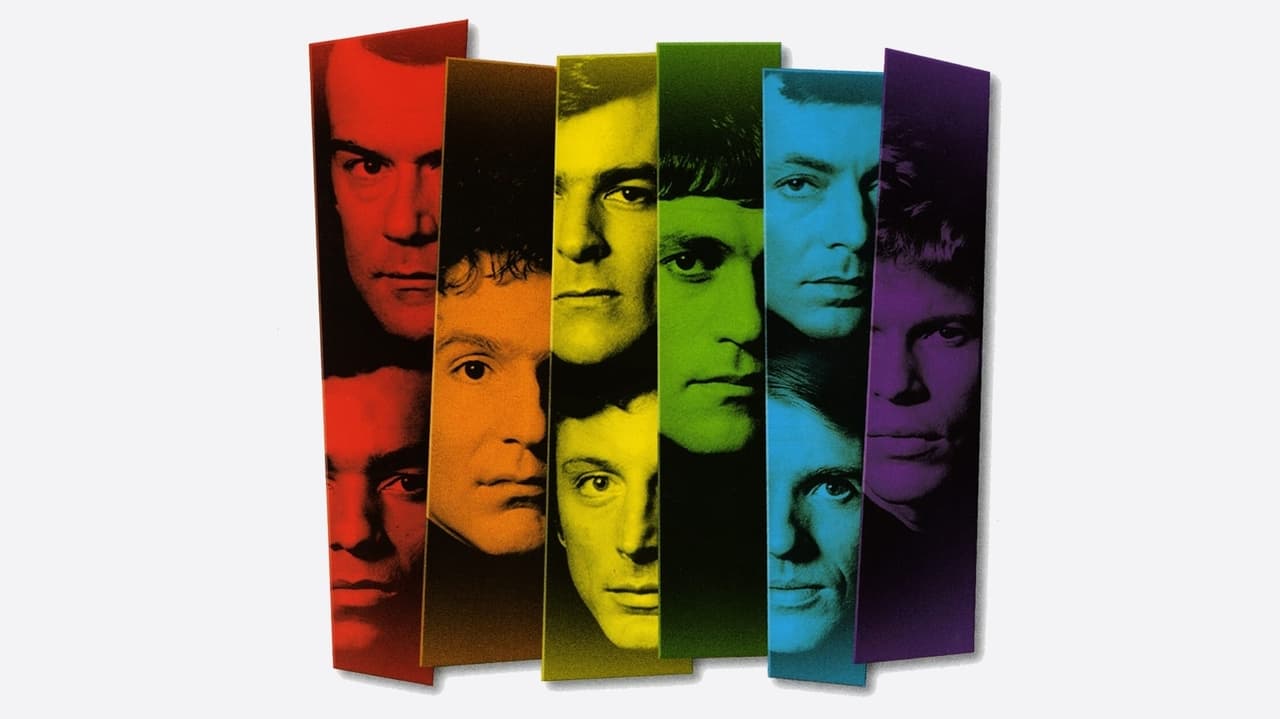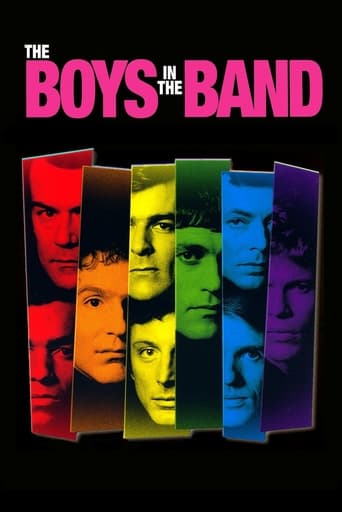



Too many fans seem to be blown away
Great Film overall
Excellent and certainly provocative... If nothing else, the film is a real conversation starter.
View MoreStory: It's very simple but honestly that is fine.
Looking at "The Boys in the Band" today is a depressing experience and not because it's about a group of self-loathing homosexuals being very nasty to each other, (you do have to put it into an historical context), but because several members of the cast have died from AIDS-related illnesses. Of course, the film does present us with every gay stereotype there is and what once appeared liberating, now might seem offensive. On the plus side, it is superbly played, (by the original NY cast), which makes the loss of so many feel all the more tragic. It also has some of the best dialogue ever written for an American play. Viewed today it is a period piece and while you may find a lot of it hateful you have to bear in mind it was groundbreaking, coming as it did at a time when homosexuality was not as freely visible on screen as it is today.
View MoreThe Boys in the Band was the ground breaking 1970 film, based on Mart Crowley's play that was probably the first mainstream theatrical film in which most of the characters are homosexual. Despite some extremely dated elements, this film was important in that it did not present all gay characters as flouncing fairies, though that stereotype is definitely represented here. What this film does do is present homosexuals in all shapes, sizes, colors, and degrees of masculinity.The film takes place during a birthday party thrown by Michael (Kenneth Nelson) for his friend Harold (Leonard Frey) with a short guest list which includes Michael's best friend Donald (Frederick Combs), a former trick with whom Michael eventually became BFF's. Hank (Laurence Luckinbill) and Larry (Keith Prentice) are in a committed relationship, though Hank seems a little more committed than Larry. Cliff Gorman is hysterically funny as the flouncing fairy Emory and Rueben Greene plays his gal pal Bernard, the only non-Caucasian party guest. Things get sticky when an old friend of Michael's from college named Alan (Peter White) shows up unexpectedly, who may or may not be gay and may or may not know about Michael and may or may not be attracted to Hank. Michael also initiates a vicious party game that turns really ugly and brings some long bubbling resentments to the surface.William Friedkin's masterful and in-your-face direction is a big plus here and the performances are uniformly first-rate down the line. Sadly, several of the actors in this film, who were gay in real life, are no longer with us, a sort of underlying message that the film still seems to send today. I also liked the fact that this film, like 1982's Making Love, addressed the fact that being married has nothing to do with sexual orientation. We learn that Hank was married and left his wife to be with Larry and Alan's confusion about it is kind of aggravating.If you have an open mind and looking for something a little different that has a significant spot in cinematic history, check this one out.
View MoreI HATED this movie for years after I first saw it (when it was new). All I could remember was the bitter bitchiness and self-hatred. I did think a contemporary review was unjust to review the whole gay world as if the movie was it and "it is a world entirely devoted to sex". Sex goes remarkably unmentioned, by today's standards, but for me BITB was a dreadful warning about what I might become if I came out to myself.Now, more than half a lifetime later, out and proud, I realise it was actually a GREAT movie, made with a lot of love by a playwright who knew exactly what he was doing and knew the gay world (indeed, the world) much better than I did.The different characters are beautifully drawn, and given entirely fitting interactions with each other. Only Harold and Michael are really damaged (by their religions' view of their sexuality, one supposes); the others are coping as well as could be expected with a hostile world. As minorities in minorities, Emory and Bernard understand each other perfectly and can play with prejudice. The push-pull between Hank and Larry (especially Larry reacting to Hank and Alan) is perfect. A lot goes unsaid, leaving room for thought afterward. We never learn exactly what Harold and Michael's history (the message on the present) is, nor whether Alan is really straight or still deeply closetted. Don offers (relative) normality for the others to reflect in.If I have a caveat, it's that I can't believe all the others would put up with Michael's games. Not one says "I've had enough of this, I'm going." But I guess you could say the same about "Who's Afraid of Virginia Woolf".
View MoreThere seems to be a common theme in reviews of this film. Are the characters true to life or not? Are they cliché or not? Well, they're both. Let's not forget: clichés are clichés for a reason! My problem with this film is not whether or not I will be tripping over Michaels at the local gay bar or should I live in fear that I may bump into a Harold (because having just watched the film, I have to tell you I'd rather eat dirt than have to sit five minutes with that insufferable turd) in the 'gaybourhood' but rather that the whole thing seemed forced. The actors did a splendid job with what they were given but the dialogue is overly melodramatic. The direction is heavy-handed. These things companied with the maudlin 'telephone game' that is the second half of the film force the whole project to collapse under its own weight. I appreciate that the film stood for something in it's day and it doesn't fall into the two worst pitfalls of gay cinema (see my review of Poster Boy) although that's mostly due to the era; however, the film borderlines on the ludicrous in the last half. The beginning- not so bad.
View More